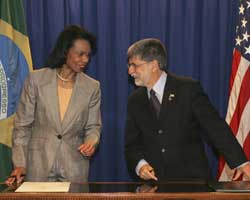 On March 9, Secretary of State Condoleezza Rice and Brazilian Foreign Minister Celso Amorim signed a memorandum of understanding to advance cooperation on biofuels. The agreement highlights the importance of biofuels as a transformative force in the region to diversify energy supplies, bolster economic prosperity, advance sustainable development, and protect the environment.
On March 9, Secretary of State Condoleezza Rice and Brazilian Foreign Minister Celso Amorim signed a memorandum of understanding to advance cooperation on biofuels. The agreement highlights the importance of biofuels as a transformative force in the region to diversify energy supplies, bolster economic prosperity, advance sustainable development, and protect the environment.
As the world's two largest producers of ethanol, the United States and Brazil intend to advance the research and development of new technologies to promote biofuels use. Reducing the cost of biofuels production, land use demands and price pressures on feedstocks, are key to increasing global adoption of biofuels. The United States and Brazil already are working through existing mechanisms such as the U.S.-Brazil Commercial Dialogue launched in 2006, the U.S.-Brazil Consultative Committee on Agriculture established in 2003, the 1999 U.S.-Brazil Memorandum of Understanding on Energy, the U.S.-Brazil Common Agenda for the Environment established in 1995, and our 1984 Framework Agreement on Science and Technology.
Regionally, the two nations intend to help third countries, beginning in Central America and the Caribbean, to stimulate private investment for local production and consumption of biofuels. The United States and Brazil expect to support feasibility studies and technical assistance in partnership with the Inter-American Development Bank, the United Nations Foundation, and the Organization of the American States.
Multilaterally, the United States and Brazil intend to work through the International Biofuels Forum to examine development of common biofuels standards and codes to facilitate commoditization of biofuels. Greater cooperation with Brazil is complementary to existing United States efforts in the Global Bio-Energy Partnership endorsed by the Group of Eight and the Asia-Pacific Economic Cooperation forum's Biofuels Task Force.
Bilateral cooperation on research, promotion of greater biofuels use in the region, and discussion of biofuels standards and codes advance energy security, reduce dependency on fossil fuels, lower greenhouse gases, and foster prosperity. Working together with Brazil to encourage greater adoption of biofuels has the potential to spur renewable energy investment, facilitate technology transfer, stimulate rural development, and boost job creation in countries around the world; this initiative does not include discussion of United States trade, tariffs or quotas.
Ethanol and other biofuels are part of a larger strategy to address energy security, cleaner air, and climate change at home and in the region.
Domestically, President Bush has set a goal of reducing America's projected annual gasoline use by 20 percent in 10 years by increasing alternative energy and improving energy efficiency. A key pillar of achieving the President's goal is diversification of supply, including the promotion of alternative fuels such as biofuels. The President's plan will help confront climate change by stopping the projected growth of carbon dioxide emissions from cars, light trucks, and SUVs within 10 years.
Internationally, the United States is working closely with governments, private sector, and multilateral organizations to advance energy security by encouraging market-led development, transparency, integration, and investment in the energy sector. The Mesoamerican Energy Initiative is a key example of regional energy integration that the United States supports through assistance from the Environmental Protection Agency, the Trade and Development Agency and the United States Agency for International Development.
2007/174

